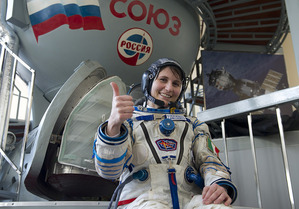
That would be a good thing.
The benefits of space exploration — a story woefully under-reported — saturate modern life, from the smartphones in our pockets to the medical procedures that cure our ills. We can only imagine what lies ahead if
| | exploration is renewed with vigor. But first we need a rallying cry. The opportunity for that may have come this week when Russian Deputy Prime Minister Dmitry Rogozin told reporters Russia will stop using the space station it shares with the United States after 2020. Ever since the space shuttle program was scuttled three years ago, the United States has relied on Russia to ferry its astronauts back and forth to the space station. Now we may be losing our ride. Rogozin didn’t draw any connections between his announcement and U.S. sanctions against Russia over the Ukrainian crisis, but it didn’t matter. Many in Congress were way ahead of him. Politico.com reported two months ago that the Ukrainian crisis was building congressional support for ending the nation’s dependence on Russia for space travel, and for funding new programs. We haven’t seen that kind of talk since Mikhail Gorbachev dismantled the evil empire. It may be popular, and mostly accurate, to blame the Obama administration for letting space exploration dwindle, but Congress deserves equal blame. It has consistently refused to fund Obama’s requests for the commercial space program her has proposed. Relying on private spacecraft may be a radical shift from the way Americans got to the moon, but it also may be a dramatic way to regain superiority in space with a minimum of cost, and perhaps even with some profit. But to get things going, the nation needs a rallying cry from its president — something that articulates a goal and a compelling reason to achieve it; something like what President John F. Kennedy said at Rice University in 1962 when he set a goal of going to the moon within the decade. That won’t guarantee smooth sailing in Washington. Even in the midst of a frightening Cold War, funding rockets was a tough political sell. Kennedy’s “We choose to go to the moon” speech may be an icon of American determination and capability now, but at the time it caused the New York Times to editorialized that Kennedy may think “drawing public attention to the moon will solace the American people for his failure to do the things he was elected to do.” But a strong statement would put some focus back into a policy commitment that once defined the nation’s greatness. Politics aside, by 1964 Kennedy’s speech had a life of its own. When Congress balked at funding NASA’s budget request that year, an associate administrator of the agency said bluntly that less money might make it impossible to reach the moon by 1969. Kennedy had specifically set a goal to do so “in this decade.” Getting there in 1970 was out of the question. It’s hard to find many other national goals traceable to a single presidential speech that carried similar weight. To understand the value of space exploration, visit spinoff.nasa.gov. You will find a wide array of benefits from eye-mapping technology that aids optical surgery to the ability to take high-resolution photographs at sporting events, allowing people to zoom in on each person in the stadium — all made possible by space research and discovery. These sorts of things weren’t evident in the beginning. In 1957, when the Russians launched the space race by sending up the first orbiting satellite, Americans showed their lack of imagination by casting the need for a space program in military terms only. We wondered how to drop bombs from outer space. Now, it may be that a renewed military threat once again revives a collective imagination that has been dormant too long. |

 RSS Feed
RSS Feed

